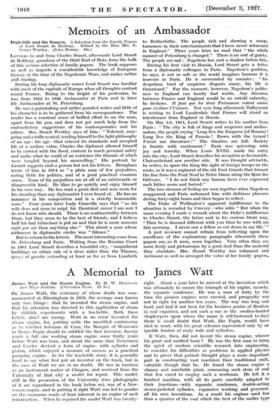- Memoirs of an Ambassador LETTERS to and from Charles
Stuart, afterwards Lord Stuart de Rothsay, grandson of the third Earl of Bute, form the bulk ' of this serious selection of family papers. The book supposes • as well as imparts a considerable knowledge of European history at the time of the Napoleonic Wars, and makes rather stiff reading.
During his long diplomatic career Lord Stuart was familiar with most of the capitals of Europe when all thoughts centred round France. Rising to the height of his profession, he was from 1815 to 1830 Ambassador at Paris and in later life Ambassador at St. Petersburg.
He was a painstaking and rather guarded writer and little of his character is to be gathered from his corsespondence. The reader has a constant sense of baffled effort to see the man, apart from his pen, and does not get much help from the contradictory suggestions of his contemporaries and his editor. Mrs. Stuart Wortley says of him : " Tolerant, easy- going and a trifle cynical, tending himself to the light philosophy of an age—his age—that relaxed its standards and accepted life at a surface value, Charles the diplomat allowed himself to be carried with the flood, content to reach personal safety and make what he could of an existence the threads of which were tangled beyond his unravelling." His portrait by Gerard suggests such a person but not his letters. Brougham wrote of him in 1814 as " a plain man of few prejudices, caring little for politics, and of a good practical common sense. None of his prejudices are at all of an aristocratic or disagreeable kind. He likes to go quietly and enjoy himself in his own way. He has read a great deal and seen more for his standing than any diplomatist I ever heard of. He has no nonsense in his composition and is a strictly honourable man." Four years later Lady Granville says that " as his wife does not seem to mind his theatrical career I am sure I do not know who should. There' is no sentimentality between them, but they seem to be the best of friends, and I believe half his bad behaviour is put on and that he is more mauvais sujet par air than anything else." This about a man whose nickname in diplomatic circles was " Silence."
But to return to the letters. The most interesting come from St. Petersburg and Paris. Writing from the Russian Court in 1801 Lord Stuart describes a beautiful city, " magnificent buildings on either side of a river wider than the Thames, quays of granite extending at least as far as from Lambeth to Rotherhithe. The people rich and showing a sump. tuousness in their entertainments that I have never witnessed in England." Three years later we read that " the whole manner of Petersburg is changed." There is no sort of gaiety. The people are sad ; Napoleon has cast a shadow before him.
During his first visit to Russia, Lord Stuart gets a letter from a diplomatic colleague in Paris. Napoleon's position, he says, is not so safe as the world imagines because it is insecure in Paris. He is surrounded by enemies ; " his despotism bred of suspicion disgusts many, his life is threatened." For the moment, however, Napoleon's polite- ness to England can hardly find words. Any disunion between France and England would be an untold calamity, he declares. It faut que les deux Puissances restent conies pour civiliser Univers. Not very long afterwards 'ralleyrand is writing to Lord Lauderdale that France will stand no interference from England or Russia.
On May 1st, 1814, Lord Stuart writes to his mother from Paris : " The city is full of kings and emperors and ambas- sadors, the people crying ' Long live the Emperor (of Russia) ! Long live the King of Prussia ! Down with the tyrant Vivent nos liberateurs ! ' The theatres arc full. Society is frantic with excitement." Paris was quivering with joy and ferocity. When Louis XVIII. made his entry into the city, Lord Stuart describes his reception as favourable. Chateaubriand saw another side. It was thought advisable, he writes, to spare the King the sight of foreign troops on the route, so it was a regiment of the old Foot Guards that formed the line from the Pont Neuf to Notre Dame along the Quai des Orfevres. " I do not think any human faces ever expressed such bitter scorn and hatred."
The two streams of feeling are seen together when Napoleon reappeared and Paris welcomed him with delirious pleasure during forty-eight hours and then began to reflect.
The Duke of Wellington's apparent indifference to the situation is recorded= by Creevey—who adds " But when the same evening I made a remark about the Duke's indifference to Charles Stuart, the latter said in his curious blunt way, Then he is damned different with you than he was with me this morning. I never saw a fellow so cut down in my life.' " A just reviewer cannot refrain from reflecting upon the excellence of the explanatory paragraphs wherewith these papers are, as it were, sewn together. Very often they arc more lively and picturesque by a good deal than the material they elucidate. Mrs. Stuart Wortley has enhanced and increased as well as arranged the value of her family papers.










































































 Previous page
Previous page